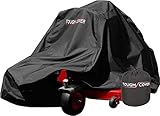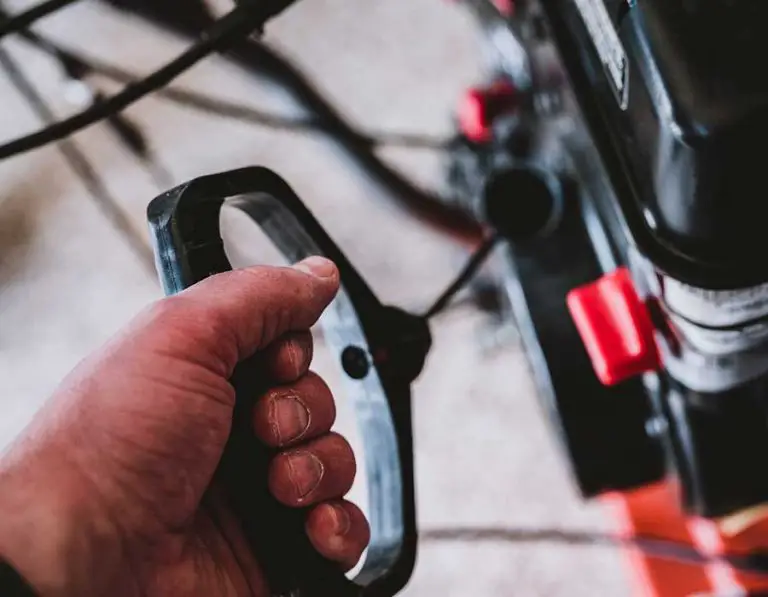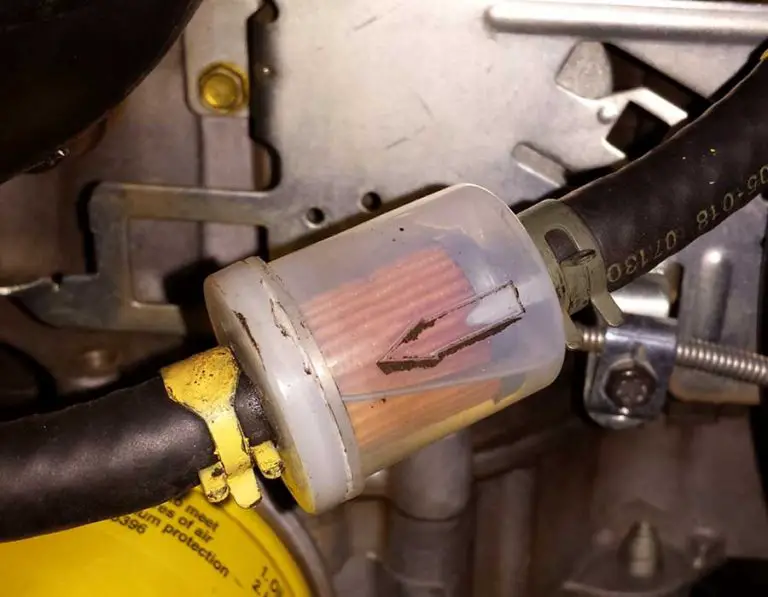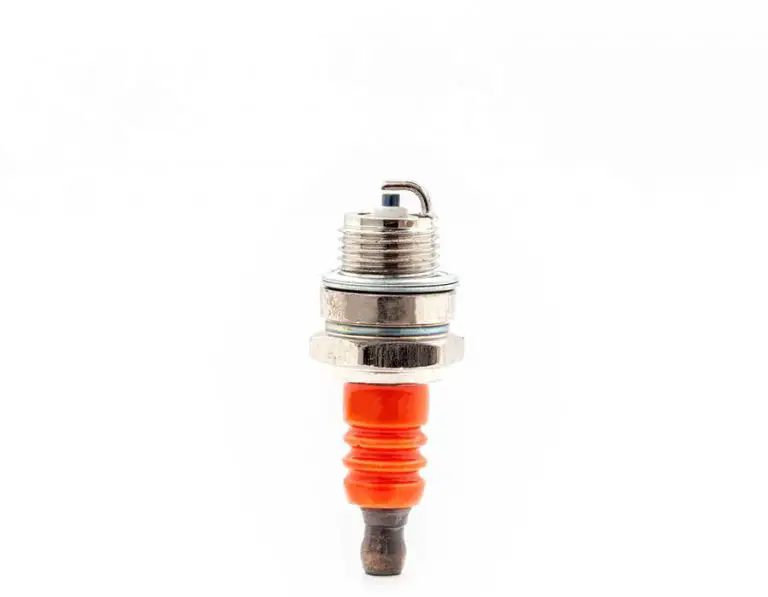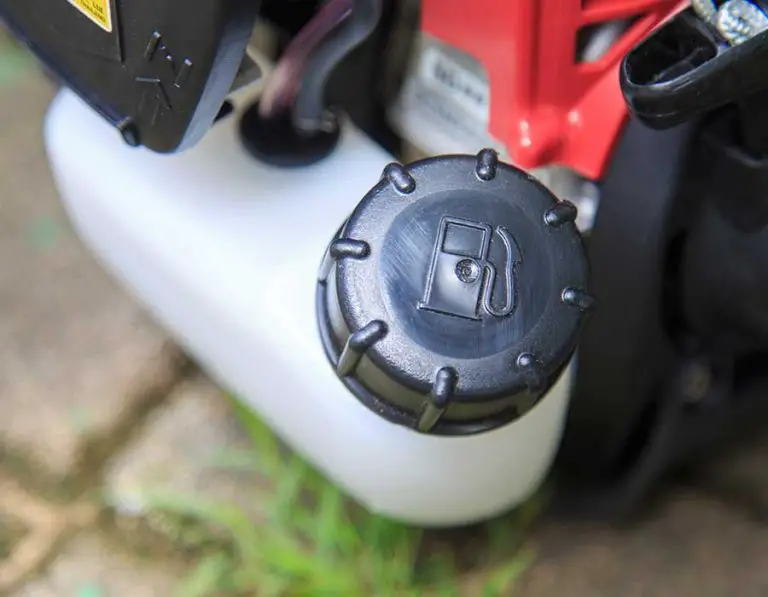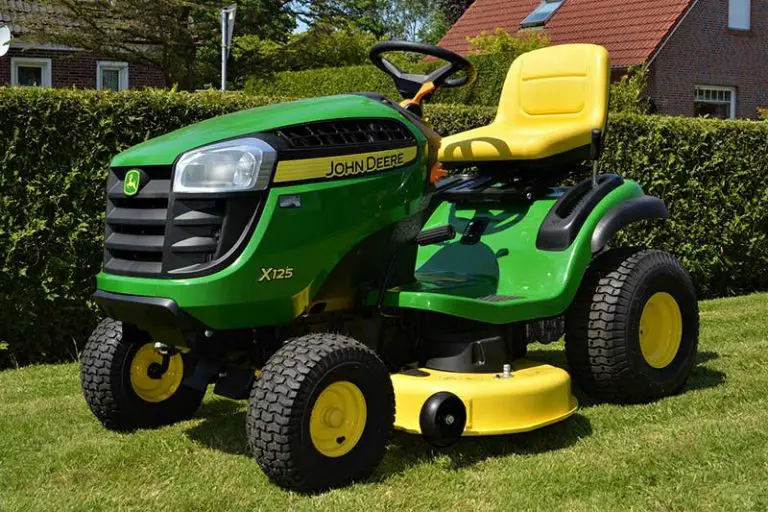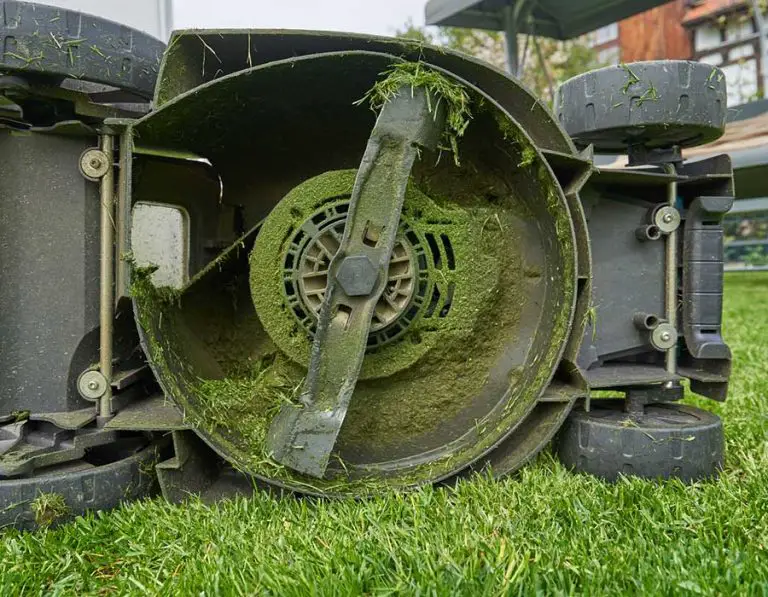How To Store A Lawn Mower Outside Without A Shed
A lawnmower is not the smallest garden appliance and finding a place to store this grass-eating machine can be a bit of a challenge if you are short on space. What alternative lawnmower storage options are there if you do not have a shed or another suitable storage space?
Lawnmowers can be stored outside in mild weather if you can keep them out of direct sunlight and keep them dry. You can cover them with a tarp and store them in a shady location, build a small shelter, or store it under your deck. Harsh winters require the mower to be stored indoors.
A lawnmower may be one of the bulkiest garden tools, but it is also one of the most expensive pieces of garden equipment. This requires that you take good care of your mower and store it in a manner that offers sufficient protection from the elements. We have some ideas for you for safe lawnmower storage without a shed.
Alternative Lawnmower Storage Options
Even if your lawnmower is old, replacing it will not be a cheap undertaking. Finding a suitable home for your lawnmower when it is not in use will save you money in the long term because your mower will last longer and not suffer damage.
Lawnmowers are hardworking machines made for outdoor work, which implies that some level of robustness must be built into their design to protect them from harsh outdoor conditions.
Even though some hardy characteristics are built into the design of a lawnmower, they are not intended to be left outdoors indefinitely in all weather extremes. Will your lawnmower be damaged if you forgot it outside for a day or two? Probably not, unless it was exposed rain, hail, or snow, but that does not mean your mower should live outdoors permanently.
What are the ideal conditions for storing a lawnmower? Understanding your lawnmower’s needs will help you find or create suitable storage options other than a garden shed.
A lawnmower’s needs for safe storage are fairly basic.
- Store your lawnmower out of direct sunlight. Direct sunlight won’t stop your mower from working, but the UV will age the plastic components on the mower, causing them to become brittle and crack and break in a short space of time.
- Store your mower out of the rain. Lawnmowers require a dry storage area; they are designed to be somewhat wether resistant, however, they aren’t desgined to be used when wet. Electric mowers may be dangerous when wet if you try to plug them in and use them. Water will also damage electrical connections in the motor and may cause the motor to fail. Gasoline motors are a little more waterproof, but if the water finds its way into the engine, your mower will only be good as a garden sculpture!
- Protect your mower from freezing temperatures. Most lawnmowers are not used in the wintertime unless you reside near the equator. Freezing temperatures can cause components to degrade in your mower’s motor, which will cause premature failure of these components. This is particularly the case where humidity can cause ice to form on the mower.
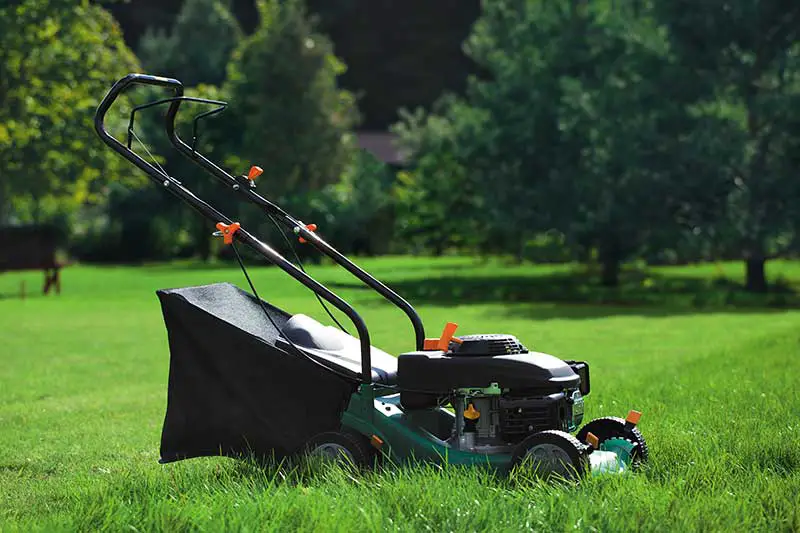
Summer Storage Options For Your Lawnmower
In the summer, your mower needs protection from direct sun and from the rain. Any place that meets these criteria would be a suitable storage location for your mower.
In the summertime, your lawnmower will be seeing frequent use, so you should store it in a place that is accessible but protected. If you do not have a suitable spot, you could summon your deeply buried DIY skills and construct a simple shelter for your lawnmower.
Here are some alternative summer storage options for your lawnmower.
- Store the mower under your deck. Most raised decks have an access portal to get under the deck to do repairs. As long as the water does not stand under the deck when it rains, you can store your mower under the deck. If your deck is not waterproof, place a small tarp or waterproof lawnmower cover over the mower before putting it under your deck.
- Build a doghouse for your mower. In some cases, you can obtain scrap wood for free, such as pallet wood, and build a small doghouse-type shelter for your mower. Place a few paving stones as a floor to elevate the mower off the ground, and you are good to go. If your DIY doghouse is not waterproof, cover the mower with a tarp before putting it away.
- Cover your mower with a tarp or cover. You can purchase lawnmower covers that are designed to protect mowers from summer outdoor conditions. You can use a custom cover, or you can use a waterproof tarp. Stand the mower in a location where it will not stand in water, cover the mower with the tarp, using bungee cords to secure the tarp in place. This will prevent the tarp from being blown off the mower during rainstorms. Once wrapped up in this way, store the mower out of direct sunlight.
Why not check out one of these recommended covers for your lawn mower:
- Heavy-Duty: This lawn mower cover is crafted with 600D marine-grade tear-proof fabric, and features double-stitched seams and a drawstring tightening mechanism. Our cover is twice the weight of the competitors - a true stamp of Tough Cover's heavy-duty quality.
- Absolute Protection: Our high-quality water-resistant lawn mower cover protects against rain, snow, UV, dust, debris, and pollen. Keep your push, gas, self-propelled, walk-behind, reel, and electric mowers in great shape!
- Universal Fit: Our push lawn mower cover is compatible with brands like Toro, John Deere, Cub Cadet, Troy Bilt, Craftsman, Honda, and more. Cover dimensions: 94" L x 19.5" W (across front) x 13.5" H.
- Easy to Use and Easy to Store: Our push mower covers provide effective coverage of the entire surface of your mower and come with a bonus practical storage bag for your convenience.
- 100% Satisfaction Guarantee: It's not just your lawn mower that's covered. We proudly stand behind all of our Tough Cover products. Your purchase is protected with an unconditional Tough Cover 18-month warranty.
- ULTIMATE PROTECTION FOR YOUR LAWN MOWER: A high-quality water-resistant interior coating delivers absolute protection for your valuable zero-turn mower
- Easy to Use & Easy to Store: This zero-turn mower cover provides effective coverage of the entire surface of your mower and comes with a bonus practical storage bag for your convenience
- Protection Against All the Elements: Our high-quality zero-turn riding mower cover features a water-resistant coating that protects all riding lawn mowers from rain, snow, UV, dust, debris, and pollen; Our accessories protect your zero-turn mower from wear and tear, even in extreme conditions
- Easy to Use & Easy to Store: This zero turn mower cover provides effective coverage of the entire surface of your mower and comes with a bonus practical storage bag for your convenience
Winter Storage Options For Your Lawnmower
Winter is generally the off-season for mowers, and they go into hibernation for the cold season. Whether you have cold winters or mild winters, you should prepare your mower for its inactive season. For cold winter dwellers, this means winterizing your mower for storage for a few months. For mild winter dwellers, the tasks are less involved.
Winter storage for your lawnmower should look slightly different from summer storage, particularly if your winters are extreme with snow, ice, and freezing temperatures.
If you have mild winters, you can store your electric mower the way you would normally store it during summer. If you have a gasoline mower, drain the fuel from the tank to prevent the fuel from going bad and damaging the motor next season. Then store the mower as you would for the summer season.
Homeowners with cold but not severe winters can also store their mowers as they would for summer but take the precaution to winterize the mower by removing fluids, disconnecting spark plugs and batteries, and even potentially having the mower serviced.
Homeowners who experience extreme winters have limited options for storing their mowers in winters dominated by ice and snow. You should also winterize your mower by removing fluids, disconnecting electrical connections such as plugs and batteries, but you will need to take more precautions with storage.
Your mower will need to be protected from the extreme conditions of your winter season by finding a spot for it where the conditions are less harsh.
Some winter storage options for your lawnmower can include the following.
- Store the mower in your basement. Many homes have a basement where the furnace and other heating appliances are located. The basement is usually warmer than the outdoors and will make a good winter storage location for your mower. Store it on bricks to keep it off the ground and cover it with a tarp to protect it from dust.
- Lease a storage unit. You may already have a storage unit, and this would be a good place to store your mower for the winter months. If you do not have a storage unit, you could lease one for the winter and store a wide variety of household and garden equipment in the safety of the unit for the winter.
- Store your mower with a service center. Some lawnmower service centers offer a winter storage service for their clients. Find out if any of the mower service centers in your area offer this option.
- Store your mower at a friend’s house. A friend or relative may have a large garage or a garden shed and may be willing to host your lawnmower for the winter months.
In extreme winter conditions, you simply have to find a way to store your mower in less harsh conditions, or the mower may not live to its full life expectancy!
See our article How Short to Cut Grass Before Winter for more winter-season mowing tips.
Conclusion
Storing a lawnmower outside without a shed is not ideal because your mower needs adequate protection from the elements.
However, you can make alternative arrangements that may not take up as much space as a shed but offer similar protection for your mower.
With a little forward planning, some DIY projects, or a little help from your friends, you can safely store your mower outside. Harsh winters are one exception to this, and you should always try to find more appropriate shelter for your mower for this season.
If you find that your lawn mower is failing to start, refer to the troubleshooting tips we have provided in our article Lawn Mower Starts then Dies.


